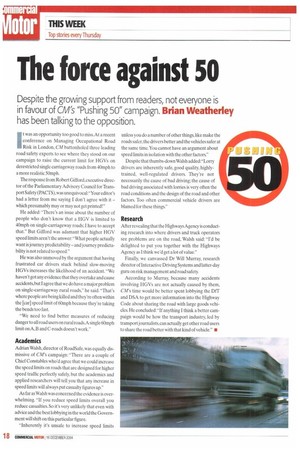The force against 50 Despite the growing support from readers,
Page 18

If you've noticed an error in this article please click here to report it so we can fix it.
not everyone is in favour of CM's "Pushing 50" campaign. Brian Weatherley has been talking to the opposition.
It was an opportunity too good to miss. At a recent conference on Managing Occupational Road Risk in London, CM buttonholed three leading road safety experts to see where they stood on our campaign to raise the current limit for HGVs on derestricted single carriageway roads from 40rnph to a more realistic 50mph.
The response from Robert Gifford, executive director of the Parliamentary Advisory Council for Transport Safety (PACTS). was unequivocal:"Your editor's had a letter from me saying I don't agree with it — which presumably may or may not get printed!"
He added: "There's an issue about the number of people who don't know that a HGV is limited to 40mph on single-carriageway roads; I have to accept that." But Gifford was adamant that higher HGV speed limits aren't the answer: "What people actually want is journey predictability — and journey predictability is not related to speed."
He was also unmoved by the argument that having frustrated car drivers stuck behind slow-moving HGVs increases the likelihood of an accident. "We haven't got any evidence that they overtake and cause accidents, but I agree that we do have a major problem on single-carriageway rural roads," he said. "That's where people are being killed and they're often within the [car] speed limit of 60mph because they're taking the bends too fast.
"We need to find better measures of reducing danger to all road users on rural roads.A single 60mph limit onA,B and C-roads doesn't work."
Academics
Adrian Walsh, director of RoadSafe, was equally dismissive of CM's campaign: "There are a couple of Chief Constables who'd agree that we could increase the speed limits on roads that are designed for higher speed traffic perfectly safely, but the academics and applied researchers will tell you that any increase in speed limits will always put casualty figures up."
As far as Walsh was concerned the evidence is overwhelming. "If you reduce speed limits overall you reduce casualties. So it's very unlikely that even with advice and the best lobbying in the world the Government will shift on this particular figure.
"Inherently it's unsafe to increase speed limits unless you do a number of other things, like make the roads safer, the drivers better and the vehicles safer at the same time. You cannot have an argument about speed limits in isolation with the other factors."
Despite that thumbs-down Walsh added:"Lorry drivers are inherently safe, good quality, highlytrained, well-regulated drivers. They're not necessarily the cause of bad driving; the cause of bad driving associated with lorries is very often the road conditions and the design of the road and other factors. Too often commercial vehicle drivers are blamed for these things."
Research
After revealing that the Highways Agency is conducting research into where drivers and truck operators see problems are on the road, Walsh said: "I'd be delighted to put you together with the Highways Agency as I think we'd get a lot of value."
Finally, we canvassed Dr Will Murray, research director of Interactive Driving Systems and latter-day guru on risk management and road safety.
According to Murray, because many accidents involving HGVs are not actually caused by them, CM's time would be better spent lobbying the DfT and DSA to get more information into the Highway Code about sharing the road with large goods vehicles. He concluded: -If anything I think a better campaign would be how the transport industry, led by transport journalists,can actually get other road users to share the road better with that kind of vehicle." •


















































































































































































































